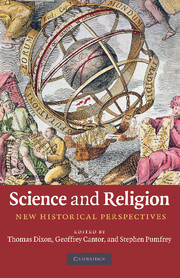Book contents
- Frontmatter
- Contents
- List of contributors
- Preface
- 1 Introduction
- PART I CATEGORIES
- PART II NARRATIVES
- 4 Religion and the changing historiography of the Scientific Revolution
- 5 The late Victorian conflict of science and religion as an event in nineteenth-century intellectual and cultural history
- 6 Islam, Christianity, and the conflict thesis
- PART III EVOLUTION AND CREATIONISM
- PART IV THE POLITICS OF PUBLISHING
- PART V WAYS FORWARD
- Select bibliography
- Index
5 - The late Victorian conflict of science and religion as an event in nineteenth-century intellectual and cultural history
Published online by Cambridge University Press: 05 May 2010
- Frontmatter
- Contents
- List of contributors
- Preface
- 1 Introduction
- PART I CATEGORIES
- PART II NARRATIVES
- 4 Religion and the changing historiography of the Scientific Revolution
- 5 The late Victorian conflict of science and religion as an event in nineteenth-century intellectual and cultural history
- 6 Islam, Christianity, and the conflict thesis
- PART III EVOLUTION AND CREATIONISM
- PART IV THE POLITICS OF PUBLISHING
- PART V WAYS FORWARD
- Select bibliography
- Index
Summary
Between 1750 and 1870 – from the publication of the Encyclopédie to the early work of Nietzsche and of Darwin's Descent of man – the relationship of science and religion in the western world passed from fruitful co-operation and modest tensions to harsh public conflict, a situation that many observers have since come incorrectly to assume to be a permanent fact of modern cultural life. To understand that Victorian clash and why historians and others should not draw excessively pessimistic conclusions from it, one must analyse the earlier nineteenth-century relations of science and religion so as to present the late-century controversy as an event to be explained rather than as an inevitable occurrence arising from necessary, existential hostilities.
Many years ago Gordon Allport observed, ‘A narrowly conceived science can never do business with a narrowly conceived religion’. Such narrow conceptions had not prevailed in 1750, but as a result of transformations within scientific and religious communities and changes in the structure of publication, education, and wider cultural discourse a narrowing of focus had come into being by the middle of the nineteenth century and with that narrowing the conflict of science and religion. In this respect Thomas Henry Huxley wrote more presciently than he may have realized when he once claimed:
The antagonism between science and religion about which we hear so much, appears to me to be purely factitious – fabricated, on the one hand, by short-sighted religious people who confound a certain branch of science, theology, with religion; and, on the other, by equally short-sighted scientific people who forget that science takes for its province only that which is susceptible of clear intellectual comprehension.
- Type
- Chapter
- Information
- Science and ReligionNew Historical Perspectives, pp. 87 - 110Publisher: Cambridge University PressPrint publication year: 2010
- 8
- Cited by

